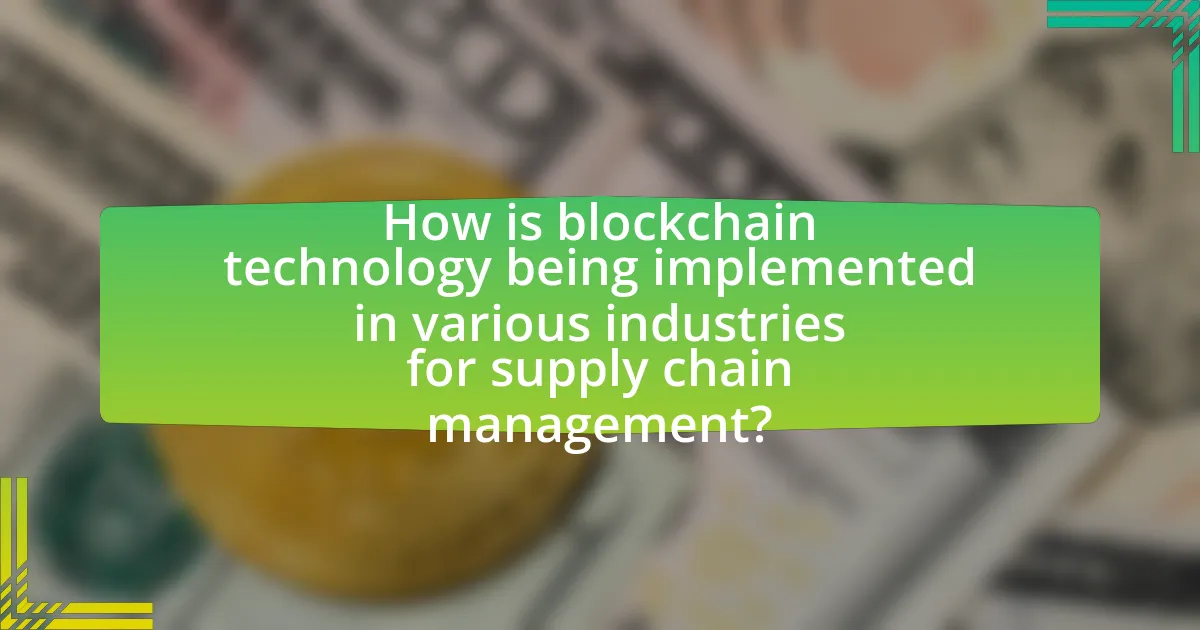The integration of blockchain technology in supply chain management significantly enhances transparency, traceability, and efficiency across various industries. By utilizing a decentralized ledger, stakeholders can access real-time data, reducing fraud and operational errors while improving inventory management and compliance with regulations. Key benefits include cost savings of up to 30%, enhanced product tracking, and increased trust among supply chain partners. However, challenges such as scalability, interoperability, and regulatory compliance must be addressed to fully leverage blockchain’s potential in supply chains. The article explores these aspects, highlighting successful implementations and future trends in blockchain technology within supply chain management.

What is the Integration of Blockchain Technology in Supply Chain Management?
The integration of blockchain technology in supply chain management enhances transparency, traceability, and efficiency. By utilizing a decentralized ledger, all participants in the supply chain can access real-time data regarding the movement and status of goods, which reduces fraud and errors. For instance, a study by the World Economic Forum indicates that blockchain can reduce supply chain costs by up to 20% through improved inventory management and reduced paperwork. Additionally, companies like IBM and Maersk have successfully implemented blockchain solutions to track shipping containers, demonstrating the technology’s ability to streamline operations and improve accountability across the supply chain.
How does blockchain technology enhance supply chain processes?
Blockchain technology enhances supply chain processes by providing transparency, traceability, and security. This decentralized ledger system allows all participants in the supply chain to access real-time data, which reduces information asymmetry and fosters trust among stakeholders. For instance, a study by the World Economic Forum indicates that blockchain can reduce supply chain costs by up to 20% through improved efficiency and reduced fraud. Additionally, the ability to track products from origin to consumer ensures compliance with regulations and enhances accountability, as evidenced by companies like Walmart using blockchain to trace food products, significantly improving their response time during recalls.
What are the key features of blockchain that benefit supply chains?
The key features of blockchain that benefit supply chains include transparency, traceability, security, and efficiency. Transparency allows all participants in the supply chain to access the same information, reducing disputes and enhancing trust. Traceability enables the tracking of products from origin to destination, which is crucial for quality control and compliance with regulations. Security is enhanced through cryptographic techniques that protect data from tampering and unauthorized access, ensuring the integrity of transactions. Efficiency is improved by automating processes through smart contracts, which reduce the need for intermediaries and streamline operations. These features collectively enhance the reliability and effectiveness of supply chain management.
How does transparency in blockchain affect supply chain trust?
Transparency in blockchain significantly enhances supply chain trust by providing an immutable and verifiable record of transactions. This transparency allows all stakeholders, including suppliers, manufacturers, and consumers, to access real-time data regarding the movement and status of goods. For instance, a study by Accenture found that 83% of supply chain executives believe that blockchain will improve transparency and trust among supply chain partners. By ensuring that all parties can independently verify the authenticity and provenance of products, blockchain reduces the risk of fraud and errors, thereby fostering greater confidence in the supply chain.
What challenges does the integration of blockchain face in supply chains?
The integration of blockchain in supply chains faces several challenges, including scalability, interoperability, and regulatory compliance. Scalability issues arise because blockchain networks can struggle to handle a high volume of transactions efficiently; for instance, Bitcoin processes about seven transactions per second, while traditional payment systems like Visa can handle over 24,000. Interoperability challenges occur as different blockchain platforms may not communicate effectively with each other, hindering data sharing across various systems. Additionally, regulatory compliance poses a significant challenge, as varying laws and regulations across jurisdictions can complicate the implementation of blockchain solutions in global supply chains. These challenges must be addressed to fully realize the potential benefits of blockchain technology in supply chain management.
What are the technical barriers to implementing blockchain in supply chains?
The technical barriers to implementing blockchain in supply chains include scalability issues, interoperability challenges, and data privacy concerns. Scalability is a significant barrier as many blockchain networks struggle to handle high transaction volumes efficiently; for instance, Bitcoin processes about seven transactions per second, which is insufficient for large-scale supply chain operations. Interoperability poses another challenge, as different blockchain platforms often lack compatibility, making it difficult for organizations to integrate their systems seamlessly. Additionally, data privacy concerns arise because blockchain’s transparency can conflict with the need to protect sensitive business information, leading to reluctance in adoption. These barriers hinder the widespread implementation of blockchain technology in supply chain management.
How do regulatory issues impact blockchain adoption in supply chains?
Regulatory issues significantly hinder blockchain adoption in supply chains by creating uncertainty and compliance challenges for businesses. Companies often face difficulties in navigating varying regulations across jurisdictions, which can lead to increased operational costs and delays in implementation. For instance, the lack of standardized regulations regarding data privacy and security can deter organizations from fully utilizing blockchain technology, as they may fear non-compliance with laws such as the General Data Protection Regulation (GDPR) in Europe. Additionally, regulatory bodies may impose strict requirements on the transparency and traceability of transactions, which can complicate the integration of blockchain systems that are designed to enhance these very attributes. This regulatory landscape can slow down innovation and discourage investment in blockchain solutions, ultimately limiting their potential benefits in supply chain management.

What are the benefits of integrating blockchain technology in supply chain management?
Integrating blockchain technology in supply chain management enhances transparency, traceability, and efficiency. Blockchain provides a decentralized ledger that records every transaction in real-time, allowing all parties to access the same information simultaneously. This transparency reduces fraud and errors, as each transaction is immutable and verifiable. For instance, a study by the World Economic Forum reported that blockchain could reduce supply chain-related costs by up to 20% through improved efficiency and reduced paperwork. Additionally, blockchain enables better traceability of products, which is crucial for industries like food and pharmaceuticals, where tracking the origin and journey of goods can prevent contamination and ensure compliance with regulations.
How does blockchain improve traceability in supply chains?
Blockchain improves traceability in supply chains by providing a decentralized and immutable ledger that records every transaction and movement of goods. This technology enables all participants in the supply chain to access real-time data regarding the origin, status, and journey of products, ensuring transparency and accountability. For instance, a study by the World Economic Forum highlights that blockchain can reduce the time spent on tracking goods by up to 80%, thereby enhancing efficiency and trust among stakeholders. Additionally, the use of smart contracts within blockchain systems automates compliance checks and reduces the risk of fraud, further solidifying traceability.
What role does blockchain play in reducing fraud and errors?
Blockchain plays a crucial role in reducing fraud and errors by providing a decentralized and immutable ledger for transactions. This technology ensures that all transactions are recorded transparently and cannot be altered retroactively, which significantly decreases the likelihood of fraudulent activities. For instance, a study by the World Economic Forum highlighted that blockchain can reduce fraud in supply chains by up to 50% by enabling real-time tracking of goods and verifying their authenticity. Additionally, the use of smart contracts on blockchain platforms automates processes and minimizes human error, further enhancing accuracy and reliability in transactions.
How does real-time data sharing enhance supply chain efficiency?
Real-time data sharing enhances supply chain efficiency by providing immediate access to accurate information across all stakeholders. This immediacy allows for better decision-making, reduces delays, and minimizes errors in inventory management and order fulfillment. For instance, a study by the World Economic Forum found that companies utilizing real-time data sharing can reduce supply chain costs by up to 15% and improve service levels by 20%. By integrating technologies like blockchain, which ensures data integrity and transparency, organizations can further streamline processes, leading to increased responsiveness and agility in the supply chain.
What cost savings can be achieved through blockchain integration?
Blockchain integration can achieve significant cost savings in supply chain management by reducing transaction costs, minimizing fraud, and enhancing operational efficiency. By utilizing smart contracts, companies can automate processes, which decreases the need for intermediaries and lowers administrative expenses. A study by Accenture found that blockchain could reduce supply chain costs by up to 30% through improved transparency and traceability, leading to fewer disputes and reduced losses from fraud. Additionally, real-time data sharing among stakeholders can streamline inventory management, further cutting costs associated with excess stock and stockouts.
How does blockchain reduce operational costs in supply chains?
Blockchain reduces operational costs in supply chains by enhancing transparency and efficiency in transactions. By providing a decentralized ledger that records all transactions in real-time, blockchain minimizes the need for intermediaries, which can lead to significant cost savings. For instance, a study by Accenture found that blockchain could reduce supply chain costs by up to 30% by streamlining processes and reducing fraud. Additionally, the immutable nature of blockchain records decreases the likelihood of disputes and errors, further lowering operational expenses.
What are the long-term financial benefits of adopting blockchain technology?
The long-term financial benefits of adopting blockchain technology include reduced operational costs, enhanced transparency, and improved efficiency in transactions. By streamlining processes and eliminating intermediaries, companies can significantly lower transaction fees and administrative expenses. For instance, a study by Accenture found that blockchain could reduce supply chain costs by up to 30% through improved inventory management and reduced fraud. Additionally, the immutable nature of blockchain enhances trust among stakeholders, leading to better collaboration and potentially higher revenue through increased customer loyalty and satisfaction.

How is blockchain technology being implemented in various industries for supply chain management?
Blockchain technology is being implemented in various industries for supply chain management by enhancing transparency, traceability, and efficiency. In the food industry, companies like Walmart utilize blockchain to track the origin of products, allowing for rapid identification of contamination sources, which improves food safety. In the pharmaceutical sector, firms such as Pfizer employ blockchain to verify the authenticity of drugs, combating counterfeit products and ensuring compliance with regulations. Additionally, logistics companies like Maersk use blockchain to streamline shipping processes, reducing paperwork and delays by providing real-time tracking of shipments. These implementations demonstrate that blockchain can significantly improve operational efficiency and trust among supply chain participants.
What industries are leading the way in blockchain supply chain integration?
The industries leading the way in blockchain supply chain integration are primarily logistics, food and beverage, pharmaceuticals, and manufacturing. Logistics companies utilize blockchain for real-time tracking and transparency, enhancing efficiency and reducing fraud. The food and beverage industry employs blockchain to ensure traceability and safety, as seen in initiatives like IBM’s Food Trust, which allows consumers to trace the origin of their food. Pharmaceuticals leverage blockchain to combat counterfeit drugs and ensure compliance with regulations, exemplified by projects like MediLedger. Manufacturing integrates blockchain for improved supply chain visibility and collaboration, streamlining operations and reducing costs. These industries demonstrate significant advancements in utilizing blockchain technology to enhance supply chain processes.
How is the food industry utilizing blockchain for supply chain transparency?
The food industry is utilizing blockchain technology to enhance supply chain transparency by providing a secure and immutable ledger for tracking the movement of food products from farm to table. This technology allows stakeholders, including producers, distributors, and consumers, to access real-time data regarding the origin, processing, and distribution of food items. For instance, companies like Walmart and Nestlé have implemented blockchain solutions to trace the provenance of food products, significantly reducing the time required to identify sources of contamination during food safety incidents. According to a 2020 report by IBM, the use of blockchain in food supply chains can reduce the time to trace food products from days to seconds, thereby increasing accountability and trust among consumers.
What examples exist of blockchain in the pharmaceutical supply chain?
Blockchain technology is being utilized in the pharmaceutical supply chain through various initiatives aimed at enhancing transparency and traceability. For instance, the MediLedger Project, which involves major pharmaceutical companies like Pfizer and Gilead, focuses on creating a decentralized network to verify the authenticity of drugs and prevent counterfeit products. Another example is the IBM Food Trust, which has partnered with pharmaceutical firms to track the movement of drugs from manufacturers to distributors, ensuring compliance with regulations. Additionally, the Chronicled platform integrates blockchain to streamline the supply chain processes for pharmaceuticals, enabling secure data sharing among stakeholders. These examples demonstrate the practical application of blockchain in improving the integrity and efficiency of the pharmaceutical supply chain.
What are the best practices for implementing blockchain in supply chains?
The best practices for implementing blockchain in supply chains include ensuring data integrity, fostering collaboration among stakeholders, and selecting the appropriate blockchain platform. Data integrity is crucial as blockchain provides a tamper-proof ledger, which enhances transparency and traceability in supply chain transactions. Collaboration among stakeholders, such as suppliers, manufacturers, and retailers, is essential to create a unified approach and share relevant data effectively. Selecting the right blockchain platform involves evaluating scalability, security features, and compatibility with existing systems, as evidenced by successful implementations like IBM’s Food Trust, which has improved traceability for companies like Walmart and Nestlé.
How can organizations prepare for a successful blockchain integration?
Organizations can prepare for a successful blockchain integration by conducting a thorough assessment of their current processes and identifying specific use cases where blockchain can add value. This involves evaluating existing supply chain operations to pinpoint inefficiencies, such as lack of transparency or traceability, which blockchain technology can address. For instance, a study by Deloitte found that 40% of organizations that implemented blockchain reported improved traceability and transparency in their supply chains. Additionally, organizations should invest in training their workforce on blockchain technology to ensure that employees are equipped with the necessary skills to manage and operate blockchain systems effectively. This preparation phase is crucial as it lays the groundwork for a seamless transition to blockchain, ultimately enhancing operational efficiency and trust among supply chain partners.
What common pitfalls should companies avoid when adopting blockchain technology?
Companies should avoid several common pitfalls when adopting blockchain technology, including lack of clear objectives, inadequate understanding of the technology, and insufficient stakeholder engagement. A clear objective is essential; without it, companies may implement blockchain for the sake of innovation rather than addressing specific supply chain challenges. Inadequate understanding can lead to misapplication of blockchain, as evidenced by a 2020 Deloitte survey indicating that 39% of organizations cited lack of knowledge as a barrier to adoption. Furthermore, insufficient stakeholder engagement can result in resistance to change and failure to achieve buy-in from all parties involved, which is critical for successful integration.
What future trends can we expect in blockchain and supply chain management?
Future trends in blockchain and supply chain management include increased transparency, enhanced traceability, and the integration of artificial intelligence. Increased transparency will allow stakeholders to access real-time data, fostering trust among participants. Enhanced traceability will enable companies to track products throughout the supply chain, reducing fraud and ensuring compliance with regulations. The integration of artificial intelligence will optimize supply chain operations by analyzing blockchain data for predictive analytics and decision-making. According to a report by Gartner, 75% of organizations will adopt blockchain technology for supply chain management by 2025, highlighting the growing importance of these trends.
How will advancements in blockchain technology shape supply chain strategies?
Advancements in blockchain technology will significantly enhance supply chain strategies by improving transparency, traceability, and efficiency. Blockchain enables real-time tracking of goods, allowing all stakeholders to access immutable records of transactions, which reduces fraud and errors. For instance, a study by the World Economic Forum indicated that blockchain could reduce supply chain-related costs by up to 20% through enhanced visibility and streamlined processes. Additionally, the integration of smart contracts can automate transactions and compliance checks, further optimizing operations. These advancements collectively lead to more resilient and responsive supply chains, capable of adapting to market changes and consumer demands.
What role will artificial intelligence play alongside blockchain in supply chains?
Artificial intelligence will enhance blockchain in supply chains by improving data analysis, optimizing logistics, and increasing transparency. AI algorithms can analyze vast amounts of data stored on blockchain to identify patterns, predict demand, and streamline operations. For instance, a study by Accenture found that integrating AI with blockchain can reduce supply chain costs by up to 30% by enabling more efficient inventory management and demand forecasting. This synergy allows for real-time tracking and verification of goods, ensuring authenticity and reducing fraud, which is critical in supply chain management.






